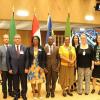News
Displaying Results 26 - 50 of 64
Transboundary rivers, lakes, and aquifers play a vital role in supporting the livelihoods of billions of people worldwide. Roughly 60% of global freshwater flow is in shared basins. About 40% of the world’s population lives in shared basins. The development and management of transboundary water…
Central Asia has significant untapped potential to decarbonize its energy systems and accelerate the sustainable energy transition, including through renewable energy development and enhanced resource management. To help the region capitalize on these opportunities, UNECE, the United Nations…
Almost all of Botswana’s territory sits within transboundary rivers basins. Although landlocked, Botswana is therefore a ‘water-linked’ country. The Cubango-Okavango, Limpopo, Orange-Senqu and Zambezi Rivers all provide crucial freshwater arteries that supply people and nature, including the…
UNECE support for the revision of the Georgian Mining Code Act is shaping the future of resource classification and estimation standards in Georgia. During a workshop in Tbilisi participants discussed how Georgian standards could play a crucial role in harmonizing with the global dimensions of the…
The Asia-Pacific region is home to some of the world's largest and most diverse reserves of minerals, energy, water, and biomass. The region accounts for around 70% of global mining production and consumption, including most of the world's bauxite, copper, iron, nickel, silver, tin, and zinc. …
An estimated 3.6 billion people face inadequate access to water at least a month per year – a figure expected to increase to more than 5 billion by 2050. According to WMO, over 50% of global catchment areas and reservoirs displayed deviations from normal conditions in 2022, of which the majority…
In the Drina River Basin, shared mainly by Bosnia and Herzegovina, Montenegro and Serbia, working together across borders and jointly addressing water and energy challenges is a key part of effective climate action and the green transition.
As part of the Sarajevo Energy and Climate Week (25-29…
The Republic of Moldova is almost entirely dependent on energy imports as it has no domestic sources of fossil fuels and makes only limited use of its renewable energy potential. At the same time, the energy intensity in the country is 3.4 times higher than the average energy intensity in the…
The building industry currently accounts for 39% of global energy-related CO2 emissions, 11% of which result from manufacturing building materials and products such as steel, cement, and glass. And yet, to date, emission reduction efforts have not really focused on decarbonizing the construction…
UNECE and partners have started implementation of a multi-year project on “Improving the energy efficiency of the global building supply chain industry and its products to deliver high performance buildings” (full project budget EUR 19.8 million), funded by the International Climate Initiative (IKI…
Bringing together countries to share progress and experience on how to effectively manage their shared waters is a key characteristic of the Water Convention. Cooperation for the management of transboundary waters to promote sustainability, peace and security is the Convention’s mantra - especially…
Countries along the middle corridor that connects Central Asia with Europe have agreed on concrete next steps to accelerate the interconnection of their national customs systems with the eTIR international system in an effort to digitalize transit in the region.
At a recent TIR Executive Board…
While underground coal mining in Albania stopped almost wholly (except for two private mines with a very insignificant output) more than 15 years ago, the abandonment of the mines from the 1990s onwards with no proper plans for closure has left a legacy of risks. These include water contamination,…
The Norwegian Government has issued a Mineral Strategy which necessitates the Geological Survey of Norway to produce an inventory aligned with the United Nations Framework Classification for Resources (UNFC).
UNFC will be crucial in this strategy as it will be used to classify mineral resources…
Central Asian countries are actively working towards improving access to water and sanitation. Despite recent progress, Kazakhstan's aging infrastructure, lack of human resources and financial constraints still limit the access of rural population to improved water and sanitation services. In 2022…
As COVID-19 continues to spread across the UNECE region, local governments are on the front lines of addressing this unprecedented pandemic. With the ambition to amplify local solutions, UNECE will bring together mayors from Europe, North America, Central Asia and the Caucasus to strengthen the…
Albania has made considerable progress in the recent years in the provision of affordable adequate housing to all. Notably, the national government has been providing support to municipal programmes for housing construction; supporting investments into construction of affordable housing,…
The coronavirus has shown the importance of adequate housing for the health and wellbeing of the population. The housing affordability challenge became especially acute in the context of the COVID-19 pandemic when Governments throughout the world requested people to “stay home”. According to Ms…
Informal settlements are a significant problem for Kyrgyzstan’s capital Bishkek. According to the estimates shared by the city government, between eighteen and twenty-five percent of almost one million inhabitants of the city live in the forty-seven informal settlements around Bishkek. These…
From nature-based solutions for urban development in Tirana, a smart urban development online platform in Prague, and the Carbon-neutral Helsinki 2035 action plan to Torino’s “Climathon” citizen engagement initiative – all over the UNECE region cities are stepping up to combat the challenges of…
Major industrial accidents can have far-reaching, transboundary and long-term impacts on populations and the environment. Without adequate coordination between land-use planning and industrial safety communities to ensure, for example, appropriate land use zoning and safety distances, the…
Today, more than half of the world population lives in cities – a number expected to grow to 70% by 2030. The concern about the pressure a growing urban population will put on cities in the future is unmistakably reflected in the distinctly urban component of the 2030 Agenda for sustainable…
In 2015, it was estimated that 1.6 billion people worldwide lacked adequate housing. While levels of homelessness vary considerably across UNECE countries, finding sustainable solutions to ensure access to housing for all members of society remains a significant challenge across the region.…
Sustainable urban development is a fundamental dimension of the ambitious 2030 Agenda. Coinciding with World Habitat Day, UNECE is organizing “Urban Week 2018” with a series of events exploring challenges and solutions for sustainable urban development, held from 1-5 October at the Palais des…
Severe accidents remind us time and time again of the need to invest in their prevention, and to mitigate their consequences, which can be far-reaching and transboundary. The cyanide spill in Baia Mare, Romania in 2000 demonstrated the devastating effects that an accident at a mining company can…















